非小细胞肺癌免疫治疗进展
- 格式:pdf
- 大小:1.25 MB
- 文档页数:5
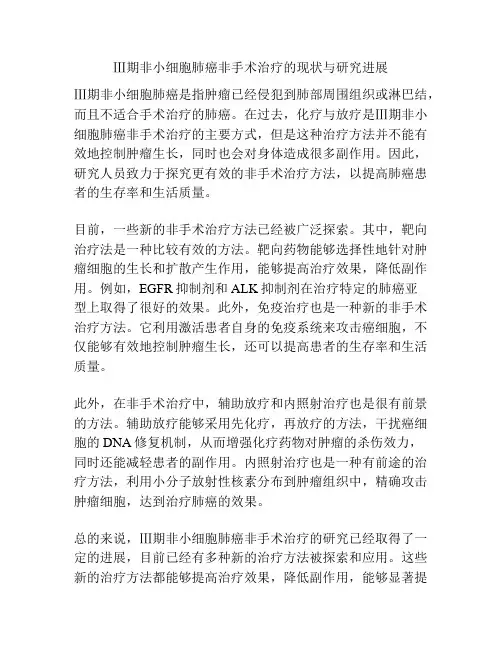
Ⅲ期非小细胞肺癌非手术治疗的现状与研究进展Ⅲ期非小细胞肺癌是指肿瘤已经侵犯到肺部周围组织或淋巴结,而且不适合手术治疗的肺癌。
在过去,化疗与放疗是Ⅲ期非小细胞肺癌非手术治疗的主要方式,但是这种治疗方法并不能有效地控制肿瘤生长,同时也会对身体造成很多副作用。
因此,研究人员致力于探究更有效的非手术治疗方法,以提高肺癌患者的生存率和生活质量。
目前,一些新的非手术治疗方法已经被广泛探索。
其中,靶向治疗法是一种比较有效的方法。
靶向药物能够选择性地针对肿瘤细胞的生长和扩散产生作用,能够提高治疗效果,降低副作用。
例如,EGFR抑制剂和ALK抑制剂在治疗特定的肺癌亚型上取得了很好的效果。
此外,免疫治疗也是一种新的非手术治疗方法。
它利用激活患者自身的免疫系统来攻击癌细胞,不仅能够有效地控制肿瘤生长,还可以提高患者的生存率和生活质量。
此外,在非手术治疗中,辅助放疗和内照射治疗也是很有前景的方法。
辅助放疗能够采用先化疗,再放疗的方法,干扰癌细胞的DNA修复机制,从而增强化疗药物对肿瘤的杀伤效力,同时还能减轻患者的副作用。
内照射治疗也是一种有前途的治疗方法,利用小分子放射性核素分布到肿瘤组织中,精确攻击肿瘤细胞,达到治疗肺癌的效果。
总的来说,Ⅲ期非小细胞肺癌非手术治疗的研究已经取得了一定的进展,目前已经有多种新的治疗方法被探索和应用。
这些新的治疗方法都能够提高治疗效果,降低副作用,能够显著提高患者的生存率和生活质量,对于控制Ⅲ期非小细胞肺癌的病情产生重要的作用。
然而,这些新的治疗方法还需要进行更加深入的研究,以探索更加有效的治疗方案。
同时,我们也需要不断地提高人们的认识和意识,加强预防和早期诊断,达到尽早发现、尽早治疗的目的。
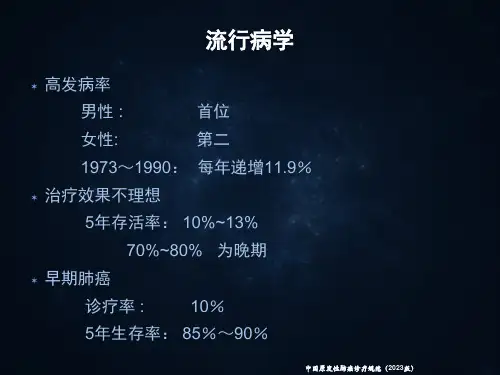
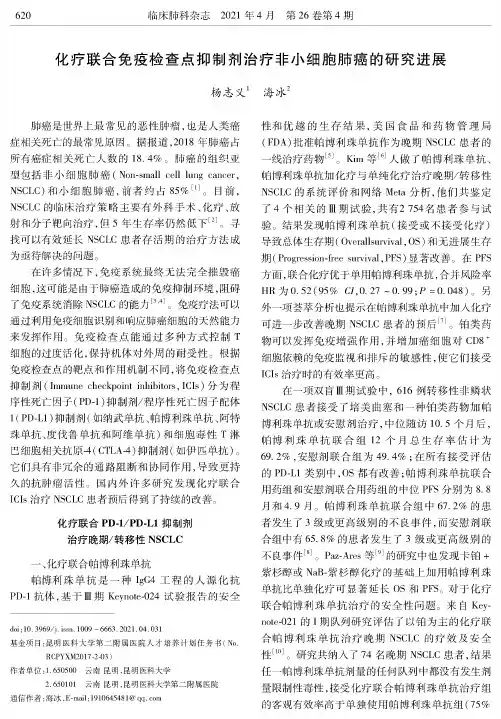
化疗联合免疫检查点抑制剂治疗非小细胞肺癌的研究进展杨志义1肺癌是世界上最常见的恶性肿瘤,也是人类癌症相关死亡的最常见原因。
据报道,2018年肺癌占所有癌症相关死亡人数的18.4%。
肺癌的组织亚型包括非小细胞肺癌(Non-small cell luny concao, NSCLC)和小细胞肺癌,前者约占85%[I]O目前,NSCLC的临床治疗策略主要有外科手术、化疗、放射和分子靶向治疗,但5年生存率仍然低下[2]$寻找可以有效延长NSCLC患者存活期的治疗方法成为亟待解决的问题。
在许多情况下,免疫系统最终无法完全摧毁癌细胞,这可能是由于肺癌造成的免疫抑制环境,阻碍了免疫系统消除NSCLC的能力*3,4+。
免疫疗法可以通过利用免疫细胞识别和响应肺癌细胞的天然能力来发挥作用。
免疫检查点能通过多种方式控制T 细胞的过度活化,保持机体对外周的耐受性$根据免疫检查点的靶点和作用机制不同,将免疫检查点抑制剂(Immune checkpoint inhibitors,ILIs)分为程序性死亡因子(PD-1)抑制剂/程序性死亡因子配体1(PD-L1)抑制剂(如纳武单抗、帕博利珠单抗、阿特珠单抗、度伐鲁单抗和阿维单抗)和细胞毒性T淋巴细胞相关抗原半(CTLA-4)抑制剂(如伊匹单抗)$它们具有非冗余的通路阻断和协同作用,导致更持久的抗肿瘤活性。
国内外许多研究发现化疗联合ILIs治疗NSCLC患者预后得到了持续的改善。
化疗联合PD-1/PD-L1抑制剂治疗晚期/转移性NSCLC一、化疗联合帕博利珠单抗帕博利珠单抗是一种LG4工程的人源化抗PD-1抗体,基于+期Keynote-024试验报告的安全dol:10.3969/血issn.1009-6663.2021.04.031基金项目:昆明医科大学第二附属医院人才培养计划任务书(No.RCPYXM2017-2-03)作者单位:1.650500云南昆明,昆明医科大学2.650101云南昆明,昆明医科大学第二附属医院通信作者:海冰,E-mail:1910645481@ 海冰2性和优越的生存结果,美国食品和药物管理局(FDA)批准帕博利珠单抗作为晚期NSCLC患者的一线治疗药物[5]$'m等*6+人做了帕博利珠单抗、帕博利珠单抗加化疗与单纯化疗治疗晚期/转移性NSCLC的系统评价和网络Meta分析,他们共鉴定了4个相关的+期试验,共有2754名患者参与试验。

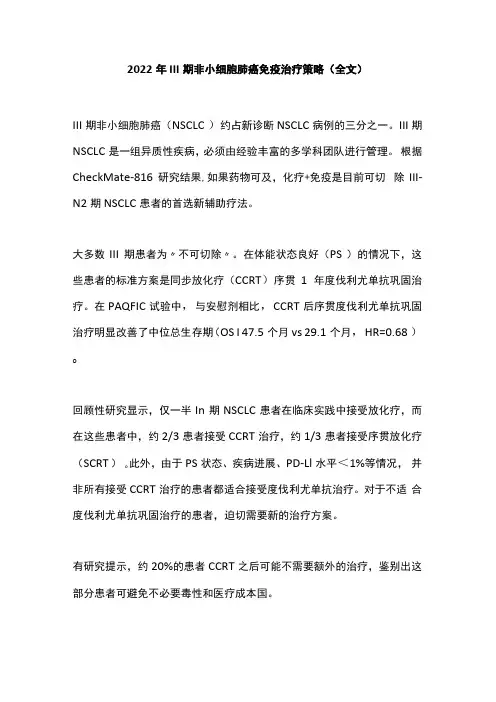
2022年III期非小细胞肺癌免疫治疗策略(全文)III期非小细胞肺癌(NSCLC )约占新诊断NSCLC病例的三分之一。
III 期NSCLC是一组异质性疾病,必须由经验丰富的多学科团队进行管理。
根据CheckMate-816研究结果,如果药物可及,化疗+免疫是目前可切除III-N2期NSCLC患者的首选新辅助疗法。
大多数III期患者为〃不可切除〃。
在体能状态良好(PS )的情况下,这些患者的标准方案是同步放化疗(CCRT)序贯1年度伐利尤单抗巩固治疗。
在PAQFIC试验中,与安慰剂相比,CCRT后序贯度伐利尤单抗巩固治疗明显改善了中位总生存期(OS I 47.5个月vs 29.1个月,HR=0.68 )o回顾性研究显示,仅一半In期NSCLC患者在临床实践中接受放化疗,而在这些患者中,约2/3患者接受CCRT治疗,约1/3患者接受序贯放化疗(SCRT )o此外,由于PS状态、疾病进展、PD-Ll水平<1%等情况,并非所有接受CCRT治疗的患者都适合接受度伐利尤单抗治疗。
对于不适合度伐利尤单抗巩固治疗的患者,迫切需要新的治疗方案。
有研究提示,约20%的患者CCRT之后可能不需要额外的治疗,鉴别出这部分患者可避免不必要毒性和医疗成本国。
度伐利尤单抗巩固治疗在III期PACIFIC试验中,709例患者完成CCRT ( >2个周期含粕化疗和54-66 Gy放疗)治疗后被随机分配(2:1)至度伐利尤单抗组和安慰剂组。
序贯度伐利尤单抗为患者带来了长期生存获益,5年OS率和无进展生存(PFS )率分别为42.9% (安慰剂组为33.4% )和33.1% (安慰剂组为19.0% )生存获益与PD-Ll表达水平无为PD-Ll表达<25% VS ≥25% \ 安全性良好,度伐利尤单抗组和安慰剂组全因≥3级不良事件(AE)发生率分别为30%和26%o国际化、回顾性PACIFI C-R研究(n = 1399 )进一步证实了PACIFIC的研究结果,研究纳入接受至少一周期度伐利尤单抗治疗的患者,在某些国家, SCRT治疗后的患者也允许入组。
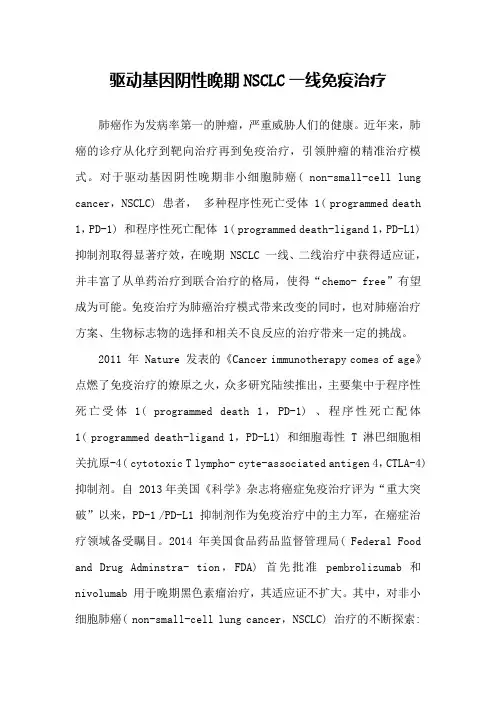
驱动基因阴性晚期NSCLC一线免疫治疗肺癌作为发病率第一的肿瘤,严重威胁人们的健康。
近年来,肺癌的诊疗从化疗到靶向治疗再到免疫治疗,引领肿瘤的精准治疗模式。
对于驱动基因阴性晚期非小细胞肺癌( non-small-cell lung cancer,NSCLC) 患者,多种程序性死亡受体 1( programmed death 1,PD-1) 和程序性死亡配体 1( programmed death-ligand 1,PD-L1) 抑制剂取得显著疗效,在晚期 NSCLC 一线、二线治疗中获得适应证,并丰富了从单药治疗到联合治疗的格局,使得“chemo- free”有望成为可能。
免疫治疗为肺癌治疗模式带来改变的同时,也对肺癌治疗方案、生物标志物的选择和相关不良反应的治疗带来一定的挑战。
2011 年 Nature 发表的《Cancer immunotherapy comes of age》点燃了免疫治疗的燎原之火,众多研究陆续推出,主要集中于程序性死亡受体1( programmed death 1,PD-1) 、程序性死亡配体1( programmed death-ligand 1,PD-L1) 和细胞毒性 T 淋巴细胞相关抗原-4( cytotoxic T lympho- cyte-associated antigen 4,CTLA-4) 抑制剂。
自 2013年美国《科学》杂志将癌症免疫治疗评为“重大突破”以来,PD-1 /PD-L1 抑制剂作为免疫治疗中的主力军,在癌症治疗领域备受瞩目。
2014 年美国食品药品监督管理局( Federal Food and Drug Adminstra- tion,FDA) 首先批准pembrolizumab 和nivolumab 用于晚期黑色素瘤治疗,其适应证不扩大。
其中,对非小细胞肺癌( non-small-cell lung cancer,NSCLC) 治疗的不断探索:从二线到一线,从晚期到局部晚期再到早期,从单药到联合,从泛人群到精准治疗,使得免疫治疗遍地开花。
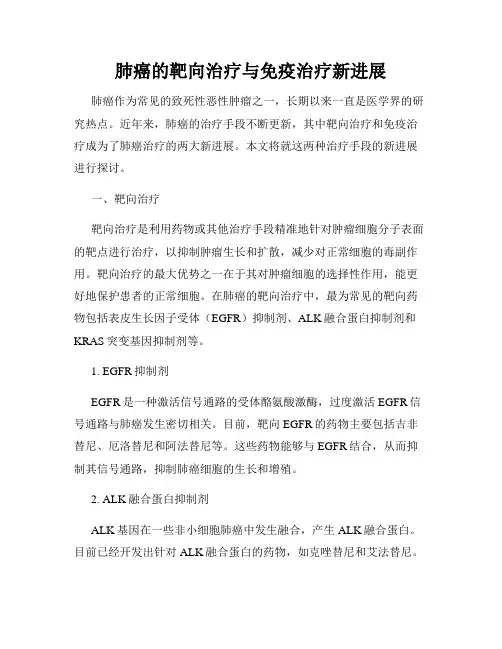
肺癌的靶向治疗与免疫治疗新进展肺癌作为常见的致死性恶性肿瘤之一,长期以来一直是医学界的研究热点。
近年来,肺癌的治疗手段不断更新,其中靶向治疗和免疫治疗成为了肺癌治疗的两大新进展。
本文将就这两种治疗手段的新进展进行探讨。
一、靶向治疗靶向治疗是利用药物或其他治疗手段精准地针对肿瘤细胞分子表面的靶点进行治疗,以抑制肿瘤生长和扩散,减少对正常细胞的毒副作用。
靶向治疗的最大优势之一在于其对肿瘤细胞的选择性作用,能更好地保护患者的正常细胞。
在肺癌的靶向治疗中,最为常见的靶向药物包括表皮生长因子受体(EGFR)抑制剂、ALK融合蛋白抑制剂和KRAS突变基因抑制剂等。
1. EGFR抑制剂EGFR是一种激活信号通路的受体酪氨酸激酶,过度激活EGFR信号通路与肺癌发生密切相关。
目前,靶向EGFR的药物主要包括吉非替尼、厄洛替尼和阿法替尼等。
这些药物能够与EGFR结合,从而抑制其信号通路,抑制肺癌细胞的生长和增殖。
2. ALK融合蛋白抑制剂ALK基因在一些非小细胞肺癌中发生融合,产生ALK融合蛋白。
目前已经开发出针对ALK融合蛋白的药物,如克唑替尼和艾法替尼。
这些药物能够特异性地与ALK融合蛋白结合,从而抑制肺癌细胞的增殖和扩散。
3. KRAS突变基因抑制剂KRAS突变是肺癌中最常见的突变类型之一,也是最具挑战性的一个靶向治疗领域。
目前,针对KRAS突变基因的靶向治疗研究正在进行中,尚未有明确的药物问世。
然而,随着技术的不断发展,相信很快会有突破性的进展。
二、免疫治疗免疫治疗是通过调节机体免疫系统的功能,促使免疫系统发挥抗肿瘤作用,以达到治疗肺癌的目的。
免疫治疗的突破点在于激活机体自身的免疫力,与传统的化疗和放疗方式相比,免疫治疗具有毒副作用小、潜伏期长、持续效应明显等优势。
1. PD-1/PD-L1抑制剂PD-1与PD-L1是免疫系统中的重要检查点,PD-L1通常通过与PD-1结合来抑制机体对肿瘤细胞的攻击。
靶向PD-1/PD-L1的抑制剂,如帕博利珠单抗和尼伐替尼等,能够阻断PD-1与PD-L1的结合,从而激活机体免疫系统,增强抗肿瘤反应。
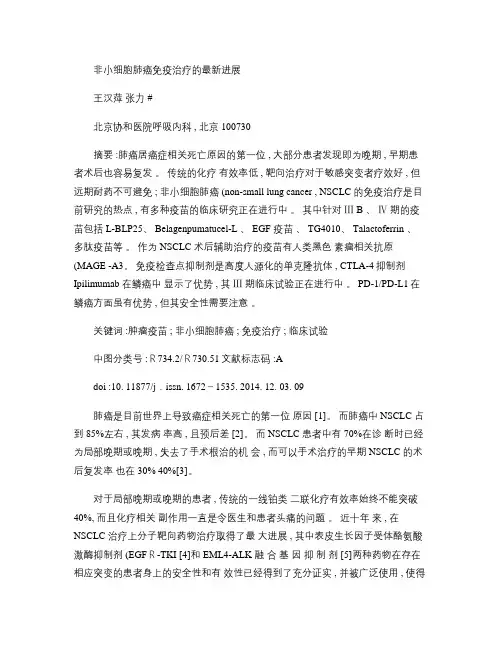
非小细胞肺癌免疫治疗的最新进展王汉萍张力 #北京协和医院呼吸内科 , 北京 100730摘要 :肺癌居癌症相关死亡原因的第一位 , 大部分患者发现即为晚期 , 早期患者术后也容易复发。
传统的化疗有效率低 , 靶向治疗对于敏感突变者疗效好 , 但远期耐药不可避免 ; 非小细胞肺癌 (non-small lung cancer , NSCLC 的免疫治疗是目前研究的热点 , 有多种疫苗的临床研究正在进行中。
其中针对Ⅲ B 、Ⅳ期的疫苗包括 L-BLP25、 Belagenpumatucel-L 、 EGF 疫苗、 TG4010、 Talactoferrin 、多肽疫苗等。
作为 NSCLC 术后辅助治疗的疫苗有人类黑色素瘤相关抗原(MAGE -A3。
免疫检查点抑制剂是高度人源化的单克隆抗体 , CTLA-4抑制剂Ipilimumab 在鳞癌中显示了优势 , 其Ⅲ期临床试验正在进行中。
PD-1/PD-L1在鳞癌方面虽有优势 , 但其安全性需要注意。
关键词 :肿瘤疫苗 ; 非小细胞肺癌 ; 免疫治疗 ; 临床试验中图分类号 :R734.2/R730.51文献标志码 :Adoi :10. 11877/j.issn. 1672-1535. 2014. 12. 03. 09肺癌是目前世界上导致癌症相关死亡的第一位原因 [1]。
而肺癌中 NSCLC 占到 85%左右 , 其发病率高 , 且预后差 [2]。
而 NSCLC 患者中有 70%在诊断时已经为局部晚期或晚期 , 失去了手术根治的机会 , 而可以手术治疗的早期 NSCLC 的术后复发率也在 30% 40%[3]。
对于局部晚期或晚期的患者 , 传统的一线铂类二联化疗有效率始终不能突破40%, 而且化疗相关副作用一直是令医生和患者头痛的问题。
近十年来 , 在NSCLC 治疗上分子靶向药物治疗取得了最大进展 , 其中表皮生长因子受体酪氨酸激酶抑制剂 (EGFR-TKI [4]和 EML4-ALK 融合基因抑制剂 [5]两种药物在存在相应突变的患者身上的安全性和有效性已经得到了充分证实 , 并被广泛使用 , 使得晚期 NSCLC 的中位生存时间得到显著提高。
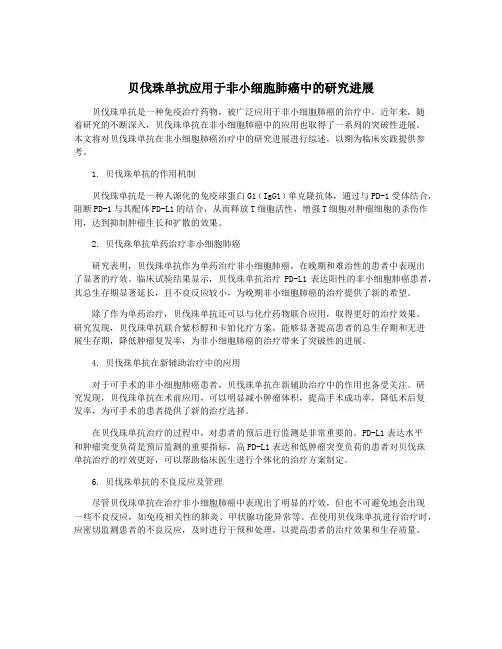
贝伐珠单抗应用于非小细胞肺癌中的研究进展贝伐珠单抗是一种免疫治疗药物,被广泛应用于非小细胞肺癌的治疗中。
近年来,随着研究的不断深入,贝伐珠单抗在非小细胞肺癌中的应用也取得了一系列的突破性进展。
本文将对贝伐珠单抗在非小细胞肺癌治疗中的研究进展进行综述,以期为临床实践提供参考。
1. 贝伐珠单抗的作用机制贝伐珠单抗是一种人源化的免疫球蛋白G1(IgG1)单克隆抗体,通过与PD-1受体结合,阻断PD-1与其配体PD-L1的结合,从而释放T细胞活性,增强T细胞对肿瘤细胞的杀伤作用,达到抑制肿瘤生长和扩散的效果。
2. 贝伐珠单抗单药治疗非小细胞肺癌研究表明,贝伐珠单抗作为单药治疗非小细胞肺癌,在晚期和难治性的患者中表现出了显著的疗效。
临床试验结果显示,贝伐珠单抗治疗PD-L1表达阳性的非小细胞肺癌患者,其总生存期显著延长,且不良反应较小,为晚期非小细胞肺癌的治疗提供了新的希望。
除了作为单药治疗,贝伐珠单抗还可以与化疗药物联合应用,取得更好的治疗效果。
研究发现,贝伐珠单抗联合紫杉醇和卡铂化疗方案,能够显著提高患者的总生存期和无进展生存期,降低肿瘤复发率,为非小细胞肺癌的治疗带来了突破性的进展。
4. 贝伐珠单抗在新辅助治疗中的应用对于可手术的非小细胞肺癌患者,贝伐珠单抗在新辅助治疗中的作用也备受关注。
研究发现,贝伐珠单抗在术前应用,可以明显减小肿瘤体积,提高手术成功率,降低术后复发率,为可手术的患者提供了新的治疗选择。
在贝伐珠单抗治疗的过程中,对患者的预后进行监测是非常重要的。
PD-L1表达水平和肿瘤突变负荷是预后监测的重要指标,高PD-L1表达和低肿瘤突变负荷的患者对贝伐珠单抗治疗的疗效更好,可以帮助临床医生进行个体化的治疗方案制定。
6. 贝伐珠单抗的不良反应及管理尽管贝伐珠单抗在治疗非小细胞肺癌中表现出了明显的疗效,但也不可避免地会出现一些不良反应,如免疫相关性的肺炎、甲状腺功能异常等。
在使用贝伐珠单抗进行治疗时,应密切监测患者的不良反应,及时进行干预和处理,以提高患者的治疗效果和生存质量。
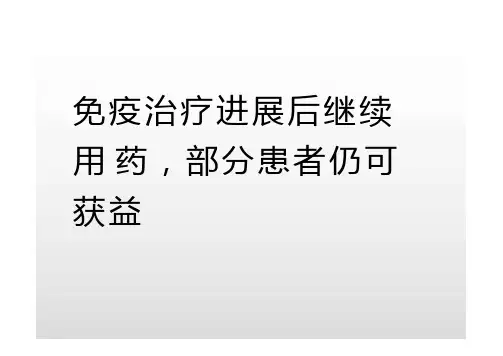
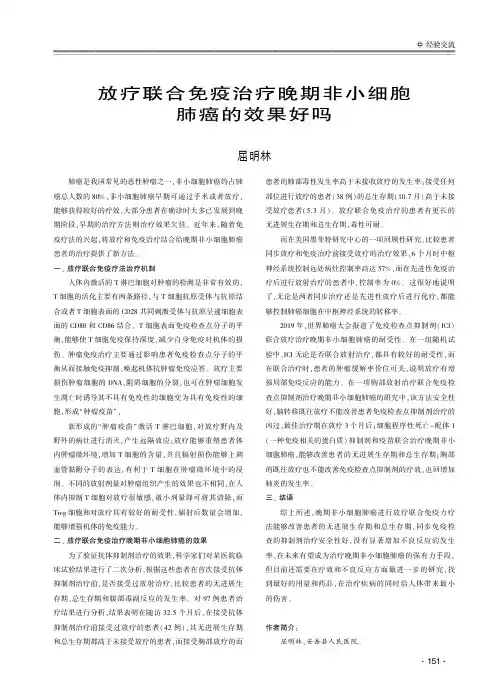
doi:10.3971/j.issn.1000-8578.2024.23.0856非小细胞肺癌免疫治疗疗效相关生物标志物研究进展郑健宏1,2,田琳2,3,赵沛妍2,3,李慧2,3,程颖2,3,4Research Progress on Efficacy-related Biomarkers of Immunotherapy in Non-small Cell Lung CancerZHENG Jianhong1,2, TIAN Lin2,3, ZHAO Peiyan2,3, LI Hui2,3, CHENG Ying2,3,41. Clinical Medical College of Changchun University of Traditional Chinese Medicine, Changchun 130117, China;2. Medical Oncology Translational Research Lab, Jilin Cancer Hospital, Changchun 130012, China;3. Jilin Provincial Key Laboratory of Molecular Diagnostics for Lung Cancer, Changchun 130012, China;4. Department of Thoracic Oncology, Jilin Cancer Hospital, Changchun 130012, China CorrespondingAuthor:CHENGYing,E-mail:******************.cnAbstract: Lung cancer is one of the most common cancers worldwide, and its mortality rate remains high. In addition to conventional surgery, radiotherapy, and chemotherapy, immunotherapy methods have been developed and used in recent years for the treatment of non-small cell lung cancer (NSCLC). However, only a small number of patients with NSCLC can benefit from immunotherapy strategies, and some patients even have hyperprogression after receiving immunotherapy. Therefore, precision immunotherapy requires effective biomarkers to guide it. In this paper, tissue samples, blood samples, intestinal microbiota, and other biomarkers are reviewed according to different sample sources. Blood samples, including TCR immune repertoire, Tregs cells, cytokines, lactate dehydrogenase, and other markers, are summarized and analyzed to provide reference for clinicians’ diagnosis and treatment decisions.Key words: Non-small cell lung cancer; Immunotherapy; Therapeutic effects; BiomarkerFunding: Capital Construction Funds (Industrial Technology Research and Development) Project Within the Budget of Jilin Province (No. 2021C042-7); Health Science and Technology Capacity Improvement Project of Jilin Province (No. 2021JC096) Competing interests: The authors declare that they have no competing interests.摘 要:肺癌是全世界最常见的癌症之一,其死亡率一直居高不下。
2024非小细胞肺癌围手术期免疫治疗摘要随着非小细胞肺癌(non-sma11ce111ungcancer,NSC1C)围手术期免疫治疗时代的到来,胸外科的麻醉管理面临新的机会和挑战。
不同麻醉方式和药物的选择会影响免疫功能和肿瘤生长转移,以免疫检查点抑制剂为代表的免疫治疗能够激活抗肿瘤免疫,影响局部和系统性免疫。
麻醉和免疫治疗可能会产生不可预知的交互作用。
本文将对麻醉方式和药物以及免疫治疗对NSC1C免疫状态和预后的影响进行综述,以期为NSC1C围手术期免疫治疗患者的麻醉管理提供新的思路。
近年来,以程序性死亡受体-1(programmedce11death-1,PD-1)/程序性死亡配体-1(programmedce11death-1igand1,PD-11)免疫检查点抑制剂为代表的免疫治疗在早中晚期非小细胞肺癌(non-sma11ce111ungcancer,NSC1C)患者中均取得了成效,开启了NSC1C围手术期免疫治疗的新时代口]。
PD-1/PD-11抑制剂半衰期长且作用持久,不仅对免疫系统有长期作用,甚至对后续药物的安全性和有效性存在影响。
麻醉方式及药物选择也对肿瘤患者的免疫应答以及肿瘤转移有一定作用。
如何优化NSC1C围手术期免疫治疗患者胸外科的麻醉管理,最大地发挥免疫系统的抗肿瘤作用,而不增加药物的毒性,目前尚不完全清楚。
本文将对麻醉方式和药物、免疫检查点抑制剂对NSC1C免疫状态和预后的影响进行综述。
01、NSC1C围手术期免疫治疗的进展CheckMate816是评估可切除NSC1C新辅助免疫联合化疗的In期临床研究,结果证实对比单纯化疗,纳武利尤单抗(PD-1抗体)联合化疗的新辅助治疗模式可显著提升可切除NSC1C患者的病理完全缓解(patho1ogiccomp1eteresponse,pCR)率(24.0%vs.2.2%)和无事件生存期(event-freesurviva1x EFS)(中位EFS:31.6个月vs.20.8个月)[2]oIMpowerOIO是可切除NSC1C经手术切除、化疗之后辅助免疫治疗的HI期临床研究,结果证实对比最佳支持治疗,术后行阿替利珠单抗(PD-11抗体)辅助治疗可显著改善PD-11≥1%的∏~ΠIA期NSC1e患者的无病生存期(disease-freesurviva1z DFS)(中位DFS:未达到vs.35.5个月)和5年总生存(overa11SUrViVa1,0S)率(5年OS率:84.8%vs.67.5%)[3]β纳武利尤单抗联合化疗用于可切除NSC1C患者的新辅助治疗、阿替利珠单抗用于NSc1C 患者的术后辅助治疗已获得国家药品监督管理局批准。
临床肺科杂志2771年5月 第26卷第5期891晚期非小细胞肺癌免疫治疗中面临的问题杜静怡-肺癌是全世界最常见的癌症死亡原因,每年大约有102万人死亡9],其中非小细胞肺癌(doPcmaC cell luny cancar , NSCLC )占所有肺癌的 35% 至99%。
肺腺癌是NSCLC 中最常见的亚型,鳞癌是第二常见亚型9]。
化学疗法、放射疗法和外科技术的 进步导致晚期NSCLC 的无进展生存期(pppressiox-freesupivai , PFS )和总生存期(overall supivai , OS )显著提高,但OS 仍然很低。
针对程序性死亡蛋白1 (pppmmmed death -( , PD-S )/程序性死亡配体 1 (pppmmmed depth-/-and 1, PD-/1 / 的免疫检查点 抑制剂(immune chechpoini indibi —rs, ICQ )的出现,拓宽了晚期NSCLC 患者的治疗选择范围,且它们具有毒性小、疗效佳的特点。
但是并非所有的NS/LC 患者都能从--治疗中获益,这可能是由于缺乏理想的疗效预测标志物和不可避免的临床耐药所致。
本文将就--在晚期NSCLC 治疗方面面临的问题进行综述。
ICIs 疗效预测标志物--是一类新的癌症治疗药物,靶向抑制性免 疫检查点分子,如PD-1、PDE1或细胞毒性T 淋巴细胞抗原 4(cytotoxic T lymphocyta antiyeo-S , CTLA-2),可以增强免疫系统的激活及抗肿瘤活性,在特定的患者中产生持久的应答9—/]o 近年来,--在 无阳性驱动基因突变的NSCLC 中的研究取得了重大进展。
--单药的疗效从二线到一线治疗均得到 了证实。
尽管如此,接受PD2/LDE1抑制剂治疗的晚期NSCLC 患者中,应答率仅约为32%,仍有相当一部分患者获益很小或没有获益。
因此,研究预 测ICQ 疗效的生物标志物是必要的。
非小细胞肺癌辅助免疫治疗的疗效评估标准
非小细胞肺癌辅助免疫治疗的疗效评估标准包括以下几个重要指标:
1. 病理缓解率:主要通过手术后病理标本的评估来确定。
其中,显著病理缓解(MPR)是一个关键的指标,它指的是新辅助治疗后瘤床内的残存活肿
瘤细胞的百分比≤ 10%,无论淋巴结内有无活肿瘤细胞残存。
多项研究表明,达到MPR的患者生存期明显长于未达到的患者。
在新辅助免疫时代,
以免疫治疗为基础的单药或联合化疗用药方案与传统化疗相比显示出明显优势,多个临床试验表明,新辅助免疫单药治疗后肿瘤MPR率可达
17%\~45%,而免疫+化疗联合方案的MPR率可高达83%。
2. 无进展生存期和总生存期:MPR与较长的无进展生存期和总生存期高度
相关。
无进展生存期指的是从治疗开始到疾病进展或患者死亡的时间。
总生存期指的是从治疗开始到患者死亡的时间。
这两个指标可以反映患者的生存质量。
3. 肿瘤标志物水平:例如癌胚抗原(CEA)和细胞角蛋白片段(Cyfra21-1)等,这些指标可以在治疗前后进行监测,以评估治疗效果。
4. 影像学评估:通过CT、MRI等影像学检查可以观察肿瘤大小的变化,从而评估治疗效果。
5. 患者的生活质量:通过评估患者的症状、体力状况、生活质量等方面的改善情况,也可以反映治疗的效果。
需要注意的是,这些标准并不是绝对的,具体的疗效评估还需要结合患者的具体情况和医生的经验来进行综合判断。
同时,患者需要在治疗过程中保持积极配合,遵守医嘱,按时进行检查和治疗,以确保治疗的顺利进行。
非小细胞肺癌治疗进展总结非小细胞肺癌占所有肺癌的85%-90%,也是最常见的癌症死亡原因。
过去50年里,肺癌治疗的各个领域都取得了巨大的进步。
ASCO2014第一天的“肺癌50年”专场,新墨西哥大学癌症中心Martin J.Edelman教授对近50年内非小细胞肺癌系统治疗所获得的发展进行了回顾总结。
演讲开始,Edelman教授首先介绍了一例52岁白人男性肺癌病例,随后介绍了化疗,特别是以铂类为基础的化疗的发展及现状。
以铂类为基础的化疗疗效明显,不仅在辅助治疗和多学科协作中,提高了早期的非小细胞肺癌的治愈率,而且起到了改善晚期非小细胞肺癌患者生活质量和延长其生存的作用。
Edelman教授还对靶向治疗在晚期非小细胞肺癌中的研究进展进行了回顾。
过去10年里,靶向治疗迅速发展,如今靶向治疗药物如抗VEGF药物贝伐单抗、抗EGFR等药物在早期非小细胞肺癌中的疗效也正在接受研究评估。
Edelman教授重点强调了以下几方面:1、对淋巴结阳性的非小细胞肺癌,尤其肿瘤大小≥4cm时,以铂类为基础的辅助化疗是标准治疗。
2、对合适的局部晚期(III期)非小细胞肺癌,同步放化疗是标准治疗。
3、对合适(PS0-1)的进展期(IV期)并且没有基因突变的非小细胞肺癌,含铂双药化疗是标准治疗,不仅能够延长生存,还能改善生活质量;对存在特征性基因突变的晚期非小细胞肺癌,针对性的靶向药物能够延长无进展生存期。
4、在晚期非小细胞肺癌,获得组织学类型(鳞癌或非鳞癌)和分子标记(EGFR、ALK、ROS、RET等)的信息,对治疗决策具有重要意义。
5、免疫治疗在非小细胞肺癌有美好的前景。
Edelman教授在对下一个50年进行展望时提出,需要将减少烟草滥用、使用有效筛查策略与改进系统治疗相结合,才有希望显著降低非小细胞肺癌的发病率和死亡率。
分子标记中KRAS也是一个尤为重要的基因,它在肿瘤细胞生长以及血管生成等过程的信号传导通路中起着重要调控作用,正常的K-ras基因可抑制肿瘤细胞生长,而一旦发生突变,它就会持续刺激细胞生长,打乱生长规律,从而导致肿瘤的发生。
中国肺癌杂志2014年3月第17卷第3期Chin J Lung Cancer, March 2014, Vol.17, No.3·综述·非小细胞肺癌免疫治疗进展何圆 尤长宣【摘要】 肺癌是全球范围内癌性死亡的首要因素,发病率、死亡率高,预后较差,急需开发一种新的高效低毒疗法。
作为术后辅助或是姑息治疗手段,免疫治疗为非小细胞肺癌患者提供了一个新的治疗方向。
免疫疗法作用机理各不相同,如免疫检测点受体抑制剂(抗CTLA4抗体、抗PD-1抗体、抗PD-L1抗体)、主动性免疫疫苗(L-BLP25脂质体疫苗、Belagenpumatucel-L 疫苗、MAGE-A3蛋白疫苗)、过继性免疫疫苗(CIK 细胞)等,研究表明免疫治疗非小细胞肺癌肿瘤缓解率较前提高,前景值得期待,II 期/III 期临床试验亦在进一步探索其临床应用价值。
本文就当前非小细胞肺癌免疫疗法原理、临床试验、不良反应及待解决问题作一概述。
【关键词】 肺肿瘤;免疫治疗;进展Advances in Immunotherapies for Non-small Cell Lung CancerYuan HE 1, Changxuan YOU21Graduate Student of Southern Medical University, Guangzhou 510515, China; 2Department of Oncology,Nanfang Hospital, Southern Medical University, Guangzhou 510515, ChinaCorresponding author: Changxuan YOU, E-mail: ycx6026@【Abstract 】 Globally, Lung cancer is the leading cause of cancer-related death of high morbidity and mortality with poor prognosis, which needs some more effective and less toxic therapies. The immunotherapies offer a novel approach for the treatment of patients with non-small cell lung cancer (NSCLC) in both the adjuvant and palliative disease settings. A number of promising immunotherapies based on different mechanism have now been evaluated showing an increasing response rate. Moreover, further phase II/III clinical trials will be indicated to explore its value. These include checkpoint inhibitors (anti-CT-LA4 antibody, anti-PD-1 antibody, anti-PD-L1 antibody), active vaccination (L-BLP25 liposome vaccine, Belagenpumatucel-L vaccine, MAGE-A3 protein vaccine) and adoptive vaccination (CIK cells). The purpose of this paper will draw a summary on the theory, clinical trials, toxicity and problems to be solved of the immunotherapies in NSCLC.【Key words 】 Lung neoplasms; Immunotherapies; ProgressThis study was supported by the grants from National Natural Science Foundation of China (No.81071847), Guangdong Natural Science Foundation (No.S2011010003881), Guangdong Provincial Science and Technology Project (No.2012B031800394), Wu Jieping Medical Foundation Funded Special Clinical Research Projects (No.320.6799.1118)(all to Changxuan YOU).DOI: 10.3779/j.issn.1009-3419.2014.03.17本研究受国家自然科学基金项目(N o.81071847)、广东省自然科学基金项目(No.S 2011010003881)、广东省科技项目(No.2012B031800394)和吴阶平医学基金会临床科研专项资助项目(No.320.6799.1118)资助作者单位:510515 广州,南方医科大学2013级研究生(何圆);510515 广州,南方医科大学南方医院肿瘤科(尤长宣)(通讯作者:尤长宣,E-mail: ycx6026@ )肺癌是全球范围内首个癌症相关性死亡因素,非小细胞肺癌(non-small cell lung cancer, NSCLC )约占肺癌总数80%-85%,吸烟、环境污染(厨房油烟、煤炭燃烧、汽车尾气)等构成肺癌发病的主要原因。
早期接受治疗NSCLC 患者超过40%会出现肿瘤复发,因此晚期NSCLC 患者5年生存率不到15%,预后较差[1]。
以铂类为基础的标准化疗方案治疗NSCLC ,患者肿瘤缓解率仅为20%-35% ,中位生存期(median overall survival, mOS )为10个月-12个月,分子靶向治疗与化疗方案相比,可延长NSCLC 患者无疾病生存期(progression-free survival, PFS ),但患者mOS 未获益[2]。
因此标准治疗或因严重不良反应(恶心、呕吐、骨髓毒性等)或因经济学毒性(分子靶向药物价格较昂贵)已使其处于治疗瓶颈水平,急需开发一种新的NSCLC 疗法。
目前免疫治疗NSCLC 在I 期/II 期临床试验中结果良好:肿瘤缓解率提高、毒副作用小、患者易耐受,这将为NSCLC 治疗开发新领域。
中国肺癌杂志2014年3月第17卷第3期Chin J Lung Cancer, March 2014, Vol.17, No.31抗CTLA4抗体细胞毒T淋巴细胞抗原4(cytotoxic T lymphocyte-associated antigen-4, CTLA4)是由CTLA4基因编码的一种跨膜蛋白质,其配体为B7-1(CD80)及B7-2(CD86)分子蛋白,可降低T细胞活性、阻碍T细胞活化通道发挥肿瘤免疫抑制作用[3]。
2011年抗CTLA4抗体(Ipilimumab)被美国食品与药品监督管理局作为首个治疗恶性黑色素瘤免疫药物批准上市。
近年来,抗CTLA4抗体治疗NSCLC II期/III期临床试验迅速开展,如Lynch等[4]报道了一项随机双盲多中心II期临床试验,入组204例III期/IV期NSCLC患者(未接受化疗),按1:1:1随机分为3组,诱导期同步治疗组静脉给予Ipilimumab+PC方案化疗4周期,后续以安慰剂+PC方案化疗2周期,序贯治疗组静脉给予安慰剂+PC 化疗2周期,后续以Ipilimumab+PC方案化疗4周期,对照组静脉给予安慰剂+PC化疗6周期,1次/3周,18周后予Ipilimumab或安慰剂维持治疗,直至病情进展或患者出现不可耐受性不良反应,旨在评价Ipilimumab联合PC 方案治疗NSCLC的疗效。
该研究发现:序贯治疗组较对照组免疫相关性无疾病生存期(immune-related PFS, irPFS)有统计学差异(5.7个月 vs 4.6个月,HR=0.72,P=0.05),但序贯治疗组较同步治疗组irPFS无统计学差异(5.7个月 vs 5.5个月,HR=0.81,P=0.13)。
序贯治疗组、同步治疗组、对照组PFS分别为5.1个月、4.1个月、4.2个月,3级/4级不良反应发生率分别为15%、20%、6%。
因此研究者认为:序贯Ipilimumab+PC方案可提高患者irPFS、PFS。
鉴于此,Reck等[5]开展了一项随机双盲多中心III期临床试验,试验计划入组920例IV期/复发肺鳞癌患者,试验组给予抗CTLA4抗体(Ipilimumab)联合PC方案化疗6周期,对照组等量给予生理盐水联合PC方案化疗6周期,后续以Ipilimumab、生理盐水维持,直至病情进展。
旨在研究一线Ipilimumab联合PC方案是否较单纯PC方案使患者生存获益,试验结果值得期待。
此外,单药抗CTLA4抗体试验亦在探索,如一项随机开放II期临床试验(NCT01471197),针对晚期NSCLC (除鳞癌)患者,旨在探索一线应用抗CTLA4抗体是否较培美曲赛使患者生存获益。
总体来说,近年来有关抗CTLA4抗体试验多趋向于探索药物联合作用机制、药物代谢、生物预后因子如绝对淋巴细胞计数、肿瘤浸润T 淋巴细胞(tumor infiltrating lymphocyte, TIL)等,这将不仅有助于开发应用抗CTLA4抗体,而且有望促进该药物实现个体化治疗[6]。
2抗PD-1抗体程序性死亡1(programmed death 1, PD-1)表面受体蛋白由PDCD1基因编码,包括:细胞外IgV结构域、跨膜结构区域以及细胞内尾部结构[3],作用于PD-1与配体PD-L1(B7-H1)、PD-L2(B7-DC)结合位点,活化CTL 细胞杀伤肿瘤[7]。
紧随抗CTLA4抗体上市,抗PD-1抗体于2011年10月进入临床试验,已见报道有:药物安全性、不良反应、生存获益研究等。
Brahmer等[8]报告一项剂量爬坡I期临床试验(NCT00730639),入组127例复治NSCLC患者,分别给予抗PD-1抗体(Nivolumab)(1 mg/kg-10 mg/kg,1次/2周)12周期,旨在探讨抗Nivolumab治疗肺鳞癌组、非肺鳞癌组NSCLC的安全性及有效性,研究发现:肺鳞癌组、非肺鳞癌组患者mOS分别为9.2个月vs 9.6个月,1年生存率分别为44% vs 41%,2年生存率分别为41% vs 17%,药物最佳剂量为3 mg/kg。